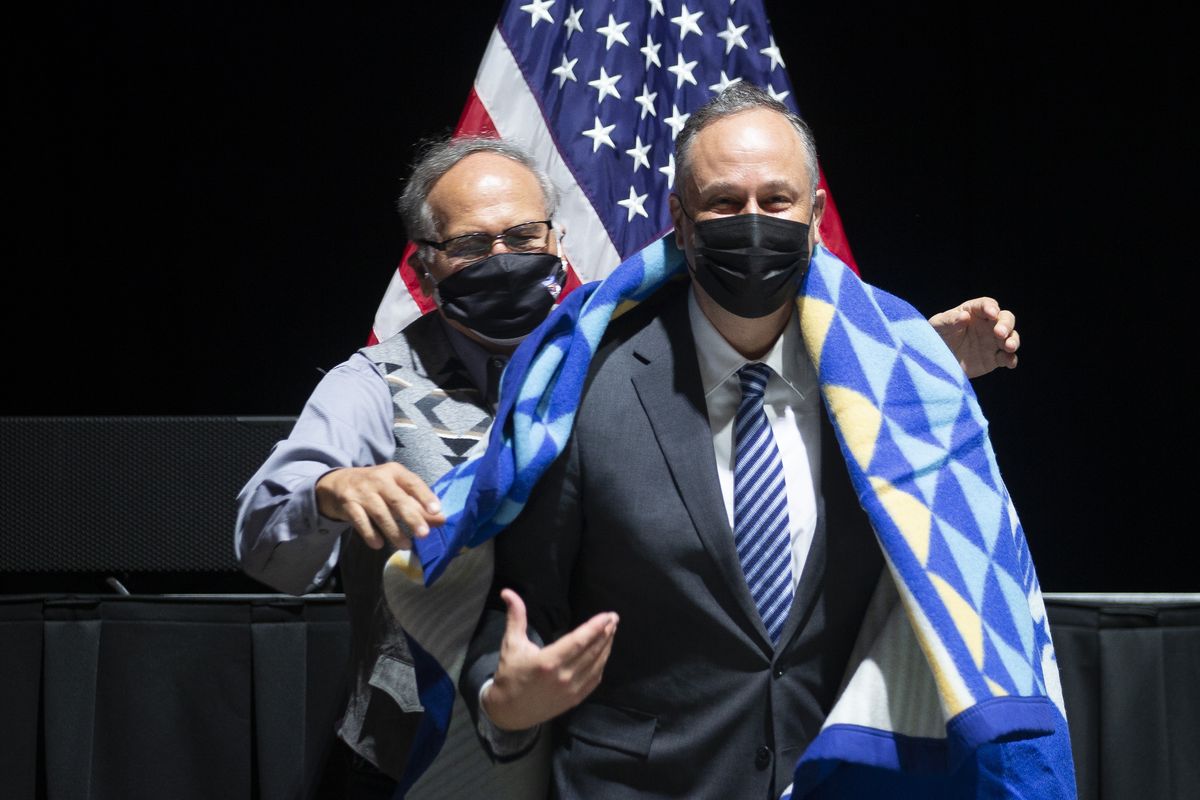‘Hope in action’: Second Gentleman Doug Emhoff visits Central Washington communities hardest hit by COVID-19

YAKIMA – At the end of a daylong tour of Yakima, the country’s first second gentleman got to see one of the first federally run mass COVID-19 vaccination sites in action.
Doug Emhoff – husband of Vice President Kamala Harris – stood next to one woman’s car and watched as a National Guard member administered her shot through the driver’s window.
“You OK?” he asked her. “It doesn’t hurt.”
The site at the Yakima Valley Central Washington State Fair Park was Emhoff’s last stop on his Tuesday visit to Central Washington, where he promoted the federal government’s $1.9 trillion American Rescue Plan. In addition to visiting the vaccination site, he met with the Yakama Nation Tribal Council and toured their cultural center.
“It’s an honor to be in this community, to see hope in action,” Emhoff said.
Emhoff praised the state and the Federal Emergency Management Agency for working together to run the site.
“You’re serving a community that’s not really been served before,” Emhoff said. “You’re building trust in this community, and you’re honoring equity.”
Members of the Biden-Harris administration have spent the past month traveling the country to visit vaccination sites and promote the stimulus package. In addition to separate money for vaccines, schools and local government, the Washington state government is set to receive more than $4 billion in flexible funds from the package.
Additionally, Washington will receive $68.8 million from the federal government to aid in vaccine distribution in communities hardest hit by the pandemic, the Centers for Disease Control and Prevention announced Tuesday.
Gov. Jay Inslee, who with Rep. Kim Schrier joined Emhoff at the mass vaccination site, said he wasn’t sure yet where that money would be going in the state, but that he anticipated much of it will go to the Yakima Valley. There are community organizations that could use some of those funds, he said.
The funding is part of $3 billion in federal funds being administered by the CDC to 64 jurisdictions across the country.
Federal mass vaccination sites like Yakima’s have popped up across the country as President Joe Biden looks to make vaccines more accessible to Americans. The sites are specifically for those in hard-hit, high-risk communities.
Yakima County saw large spikes of COVID-19 cases and deaths last summer, with Hispanic populations and agriculture workers among those hit hardest. It became one of the first places in the state to have a mask mandate.
“(Yakima) is a place that both needs it most and can show the rest of the country how to make it work,” Inslee said.
All of the signs at the Yakima site are in both English and Spanish, and no documentation is needed to get a shot.
“This is a safe place,” Schrier, a Democrat, told reporters in both English and Spanish. “You do not need documents. You do not need to be a citizen.”
The site has the capacity to administer 1,200 vaccinations a day, according to the Federal Emergency Management Agency, which approved the site two weeks ago. Through Sunday, the site had administered 5,835 doses.
The site will be open for about eight weeks.
Emhoff, Inslee and Schrier also addressed the issue of vaccine hesitancy, urging everyone to get a shot when they become eligible.
Vaccines work, Emhoff said, adding everyone should be confident in vaccines’ safety and effectiveness.
“We need to make sure that when we have abundant supply, we still have abundant demand,” Schrier said.
The first half of Emhoff’s day was spent with leaders from the Yakama Indian Nation, another group disproportionately affected by the pandemic.
Emhoff expressed his gratitude to the Yakama Nation Tribal Council, which he said has had to sacrifice throughout the pandemic.
Members brought their concerns to Emhoff about the effects the pandemic has had on the tribe. Tribal Council Chairman Delano Saluskin said the tribe has had 1,200 positive COVID-19 tests and 49 deaths from the virus.
“It has impacted our ability to govern,” Saluskin said.
He also expressed concerns with the tribal school having to pause in-person learning. Tribal schools are where students learn about their culture and Native language, he said.
“The pausing of culture and tradition in the name of public health was so inspiring and a model for the rest of us to follow,” Emhoff said.
Emhoff said the Biden-Harris administration is committed to working with Native Americans, and the money they are receiving in this stimulus package is “just a first step,” as he knows tribal governments are hurting right now.
For tribal nations across the country, the federal stimulus package provided more than $31 billion to aid in education, housing and preserving Native languages, including $20 billion emergency funding for tribal governments to manage the pandemic.